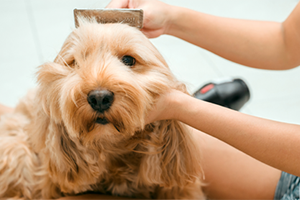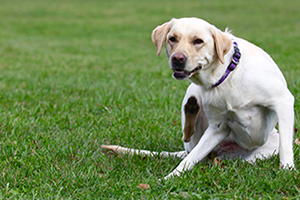
Boxer

An adoring pet with boundless energy and a mischievous sense of humour
Vital stats
Swipe to view more
| Size: | Medium to large |
| Coat: | Short and smooth, with minimal grooming required. |
| Exercise | 2 hours a day |
| Life span: | 10+ years |
| Flat-faced: | Yes, consider this breed's additional health needs before buying |
| Breed group: | Working |
| Temperament: | Playful, energetic, confident |
Boxer temperament & personality

Boxer dogs are loyal, loving and athletic. This firm, muscular breed is considered a good dog for families, especially if you have an active lifestyle.
- When properly socialised, Boxers are patient and protective making them a good fit for households with children and other animals, including cats.
- This breed’s loyalty is returned by their owners – it is said that once you have a Boxer, you’ll never have another breed.
- Boxers are known for their high-energy personalities, so be prepared for plenty of walks and playtime to keep this fun-loving canine out of mischief!
- Because of their loyalty, Boxers can be wary of strangers, but will rarely show aggression. Good socialisation from an early age will help your Boxer take meeting new people and pets in their stride.
- Despite their size and muscular build, Boxers have a tendency to think they’re lapdogs, and will try to lie as close to you as possible for maximum cuddles.
Boxer training & exercise

Training tips
- An intelligent breed, Boxers love to learn – tap into this from a young age by taking them to puppy obedience classes from around 3 to 6 months old. This will help you teach them the basic commands and provide essential socialisation experiences for your pup!
- Whilst they are intelligent and loving, Boxers can also exhibit a stubborn streak. For this reason, they respond best to positive reinforcement training methods.
- Since Boxers are stocky, muscular dogs, early lead training is essential, before they get too strong to manage.
- Boxers can take a while to housetrain and crate training is recommended for this breed.
Exercise
- Whilst Boxers do need lots of exercise (around 2 hours a day), moderation is key when it comes to this breed. Due to their short snouts and propensity for overheating, it is best to spread walks and exercise out throughout the day.
- Between walks, make sure your Boxer’s brain is getting a workout too – this intelligent breed needs plenty of mental stimulation to stop them from becoming bored.
Keeping them happy
- Boxers are a brachycephalic breed, meaning they have a short snout. This can mean they are prone to overheating, especially in hot summer months. Make sure they have access to plenty of water as well as shady spots to escape the heat.
- Due to their loyal natures, Boxers can be prone to separation anxiety so are usually happiest in households where someone will be around most of the day. If you do have to leave your dog alone for a few hours, make sure they have plenty of toys to keep them busy or have someone check in on them.
Game ideas
- Boxers love to chase, so a simple game of “fetch” is enough to keep your Boxer happy. Just be careful your dog doesn’t overexert themselves and keep an eye out for signs of overheating such as excess panting.
Common Boxer health conditions

Boxer grooming

Do Boxers shed? Yes, at certain times of year they can heavily moult their short hair; this is known as “blowing coat” and usually happens in spring and autumn.
- Apart from in their heavy shedding seasons, Boxers are fairly low maintenance and don’t need much grooming. Brushing occasionally will help to keep shedding at bay.
- Some Boxers will even lick and groom themselves, like cats do.
- Boxers can be prone to sensitive skin, so it’s advised to only bathe them on a monthly basis if it’s necessary. Use a high-quality shampoo and rinse and dry properly to prevent any skin irritation. Pay special attention to drying their facial folds which can trap moisture and become infected.
- Grooming sessions are a good time to check your Boxer’s ears for signs of infection such as black or brown wax or a strange smell.
Boxer nutrition

Boxer puppies continue growing for a long time, and will continue to broaden into adulthood, so it’s important to support their growth with the right nutrition.
- It is recommended that the best meal plan for Boxers is a mix of wet and dry food. Crunchy biscuits will help to maintain good dental health, as Boxers can sometimes suffer from bad breath.
- To reduce the risk of gastric problems, it’s best not to feed your Boxer dog immediately before exercise
Boxer frequently asked questions
Discover some of the most popular dog breeds
Boxer insurance considerations
We always offer these things as standard:
Physiotherapy & pet therapies
Along with physiotherapy, which is covered within the Vet Bills benefit, we also cover Pet Therapies like herbal medicine, homeopathy and acupuncture. You can also claim for hydrotherapy, up to £500 per illness/injury in dogs and cats (no additional limit for rabbits).
Petplan is a trading name of Pet Plan Limited (Registered in England No. 1282939) and Allianz Insurance plc (Registered in England No. 84638), Registered office: 57 Ladymead, Guildford, Surrey GU1 1DB.
Pet Plan Limited is authorised and regulated by the Financial Conduct Authority. Financial Services Register No. 311969. Allianz Insurance plc is authorised by the Prudential Regulation Authority and regulated by the Financial Conduct Authority and the Prudential Regulation Authority. Financial Services Register No. 121849. Pet Plan Limited is a subsidiary of Allianz Insurance plc.













































